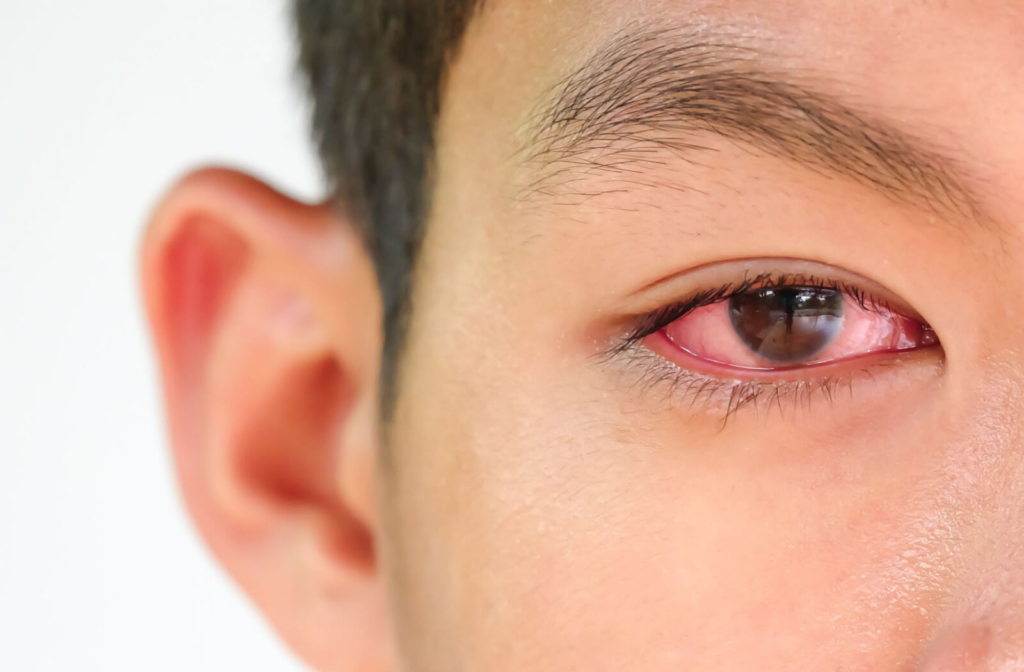Have you ever experienced severe eye discomfort after spending the day on the beach or enjoying the snow-covered landscape? Were you wearing low-quality eye protection or none at all? Sunburned eyes are a possibility after a day of fun in the sun. Like your skin, the sun can have painful, long-term effects on your eyes unless you take steps to prevent it. Sunglasses go a long way in protecting your eyes from photokeratitis or eye sunburn.
The optical team at Optical Illusions can help you find the best sunglasses for your favorite activities and everyday wear, whether you’re adding prescription lenses or not.
What Is Photokeratitis?
Sometimes referred to as ultraviolet keratitis, photokeratitis is an inflammation of the cornea, the clear dome surface at the front of your eye, resulting from sun exposure. The conjunctiva, the transparent tissue covering the whites of the eyes and inner eyelids, is also at risk of sunburned damage.
Long-term sun exposure can damage internal structures of the eye, including the lens, which sits behind the iris and pupil to focus light to the retina, and the retina itself, which receives and processes light.

What Causes Photokeratitis?
Ultraviolet (UV) rays, particularly UVA and UVB rays, can negatively impact your eyes and vision both temporarily and in the long term. You don’t have to be looking at the sun to develop photokeratitis; You can be at risk if you’re:
- Near water, which can reflect the sun off the lake, ocean, pool, and even sand
- In the city, where the sun can reflect off buildings, concrete, and cars, even on cloudy days
- On the mountains, where you may experience snow blindness while skiing, snowboarding, climbing, or hiking
What Do Sunburned Eyes Feel Like?
Photokeratitis symptoms can vary in intensity depending on the length of time you’re exposed to harmful UV rays, but they can be deeply uncomfortable. Some of the most common symptoms of photokeratitis include:
- Gritty sensation
- Eye pain
- Twitching of the eyelid
- Excessive tearing
- Swelling
- Redness
- Headaches
- Light sensitivity
- Seeing halos in your vision
- Blurry vision
In very rare cases, some people experience temporary vision loss or changes in color vision. Typically, symptoms disappear within 48 hours, but if your symptoms don’t fade or increase in severity, the doctors at Optical Illusions can examine your eyes and help relieve symptoms with at-home remedies or eyedrops.
What Are the Dangers of UV Exposure for Your Eyes?
You always hear about the damage UV rays can cause sunburned skin, but the potential damage to your eyes isn’t as universally known. If you experience photokeratitis frequently or have sustained exposure to UV rays, over time, you can develop certain ocular conditions.
Cataracts
Basking in the sun without eye protection can cause cataracts to develop. The eye’s lens refracts or bends light entering your eye, enabling you to see clearly. When the natural lens inside your eye becomes cloudy, it can indicate you have a cataract, making it seem like you’re looking through a foggy window.
Cataract development is slow and can take years of UV exposure to impact your vision and quality of life. Wearing protective goggles and sunglasses at all ages can help prevent cataracts.
Macular Degeneration
When photokeratitis causes permanent damage to the retina, it can cause deterioration of the macula, a small area at the back of the eye in the center of the retina. Macular degeneration is often associated with aging, but it can also result from prolonged, chronic overexposure to harmful UV rays and can cause central vision loss.
Growths on the Eye
Pterygium, a growth of tissue on the eye, can develop on the conjunctiva and grow to cover a portion of the cornea, leading to vision problems. Eye growths are believed to be directly linked to UV exposure and can cause redness, swelling, yellow bumps on the whites of the eye, and burning, itching, or grittiness in the eye.
Wearing sunglasses regularly is one of the best preventative measures against developing pterygium or other eye growths.
Eye Cancers
The skin surrounding your eyes is delicate and sensitive. Since you can’t apply sunscreen to the area, sunglasses are the primary way to protect your eyes from the development of cancerous cells. The most common form of eye cancer is ocular melanoma; however, eye cancers are generally rare.
Ocular melanoma can be difficult for you to detect on your own. During a comprehensive eye exam, the doctors at Optical Illusions can skilfully screen for signs of eye cancer and monitor signs of sun exposure-related conditions.
How to Find the Right Pair of Sunglasses
Sunglasses are one of the most effective, easiest, and most fashionable ways to protect your eyes from the sun’s damaging rays and photokeratitis. You should pick this must-have eyewear with care because not all sunglasses offer the same level of protection.
Optical Illusions’ dedicated opticians are experienced and knowledgeable about what makes a great pair of sunglasses. Not only can we help you look and feel amazing while you wear them, but you can be confident they’re keeping your eyes healthy.
Some qualities to consider when you’re shopping for your sunglasses include the following:
- Darker glasses don’t always offer the best protection—what matters most is that they block 100% of UV rays.
- The bigger, the better—oversized sunglasses are always in style, perhaps partly because they offer the most protection. The more surface area the lenses cover, the better protection they offer.
- Consider when you’ll be using them—like sunscreen, you should wear sunglasses every day. But a single pair may not be appropriate for every situation. Goggles are better for skiing, snowboarding, and watersports, while impact-resistant sunglasses are best for outdoor sports.
Let Us Help You Find the Perfect Pair
Whether you’re looking for prescription sunglasses or shades to wear over contact lenses, our opticians can craft customized sunglasses with premium lens coatings, anti-glare, and scratch resistance so your glasses can keep your eyes safe and vision clear.
Visit Optical Illusions and meet our experienced opticians for a personalized shopping experience for frames, lenses, and sunglasses.



